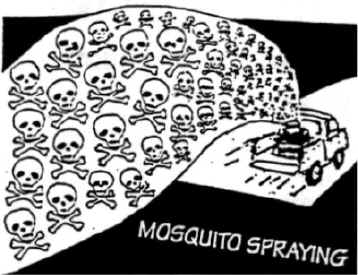 |
No Spray News James Irwin |
May 21, 2002 Page 2
 |
No Spray News James Irwin |
May 21, 2002 Page 2
West Nile Virus: Is This the Year?
Will West Nile virus arrive in SC this year? Last year it was on all sides of South Carolina, but didn't make it across the border. Ironically, WNV's more lethal cousin St. Louis encephalitis periodically affects other southern states, but there has never been a recorded case here in South Carolina.
Mosquito Control Agencies Play the Disease CardMosquito control officials often claim (or at least imply) that routine mosquito spraying prevents outbreaks of mosquito-borne diseases. For example, Assistant City Manager Charles Austin wrote to me in a Feb. 27 letter that: "According to staff members of the Inspections Department, they see mosquito spraying not as a nuisance control, but as disease suppression."
But Health Agencies Oppose Routine Spraying Ironically, health departments and those who believe that spraying can be of value in a mosquito-borne disease outbreak criticize routine spraying as the equivalent of antibiotic abuse. The Pan American Health Organization's recommendations provide one example:"Because space spraying increases selection pressure for insecticide resistance and does not provide effective and sustainable control, PAHO (Pan American Health Organization) policy discourages its routine use; however, several programs continue to apply adulti- cides as space sprays (i.e., spray for mosquitoes] on a routine basis, often for political rather than technical reasons." -Nathan, M.B., "Ae. Aegypti Control in the Caribbean", Journal of the American Mosquito Control Assn. 1993
New York: Widespread Spraying "Not Advocated" Despite WNV
In New York state (where West Nile virus is well-established):
The New York State Department of Health is urging people to take common sense precautions to reduce their exposure to mosquito bites and to continue to eliminate stagnant water where mosquitoes breed. The NYS DOH WNV materials do not advocate widespread application of mosquito adulticide pesticides. However, in NYS, decisions about mosquito control rnethods are made by local jurisdictions.
Society of Vector Ecology Finds
"Increasing Resistance" to Mosquito Insecticides